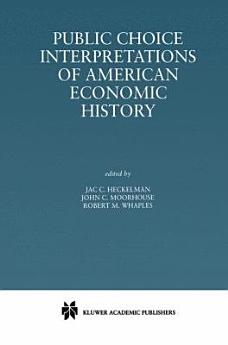Public Choice Interpretations of American Economic History
Jac. C. Heckelman · John C. Moorhouse · Robert M. Whaples
Dec 2012 · Springer Science & Business Media
Ebook
188
Pages
reportRatings and reviews aren’t verified Learn More
About this ebook
Jac C. Heckelman, John C. Moorhouse and Robert Whaples The eight chapters of this volume are revised versions of papers originally presented at the "Applications of Public Choice Theory to Economic History" conference held at Wake Forest University, April 9-10, 1999. They all apply the tools of public choice theory to the types of questions which economic historians have traditionally addressed. By adding the insights of public choice economics to the traditional tools used to understand economic actors and institutions, the authors are able to provide fresh insights about many important issues of American history. 1. DEVELOPMENTS IN PUBLIC CHOICE THEORY Economists have historically sought to develop policies to improve social welfare by correcting perceived market failures due to monopoly power, externalities, and other departures from the textbook case of the purely competitive model. An underlying assumption is that the public sector, upon recognizing the market failure, will act to correct it. Applied work often develops the conditions under which these policies will be optimal. The public choice movement has questioned the false dichotomy established by welfare economists. Economists of all persuasions assume traditional private market actors, such as entrepreneurs, managers, and consumers, are self-interested rational maximizers. Why should this not hold for all economic agents? The innovation of public choice analysis is to show what happens when public sector actors, such as politicians, bureaucrats, and voters, also behave as rational self-interested maximizers.
Rate this ebook
Tell us what you think.
Reading information
Smartphones and tablets
Install the Google Play Books app for Android and iPad/iPhone. It syncs automatically with your account and allows you to read online or offline wherever you are.
Laptops and computers
You can listen to audiobooks purchased on Google Play using your computer's web browser.
eReaders and other devices
To read on e-ink devices like Kobo eReaders, you'll need to download a file and transfer it to your device. Follow the detailed Help Center instructions to transfer the files to supported eReaders.






